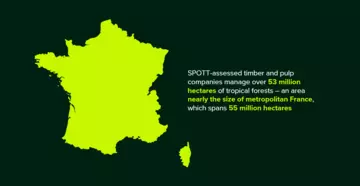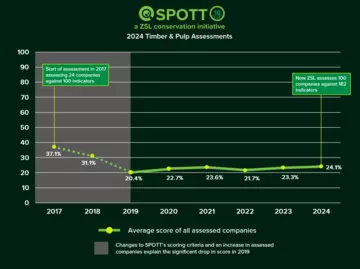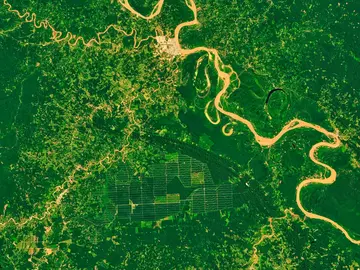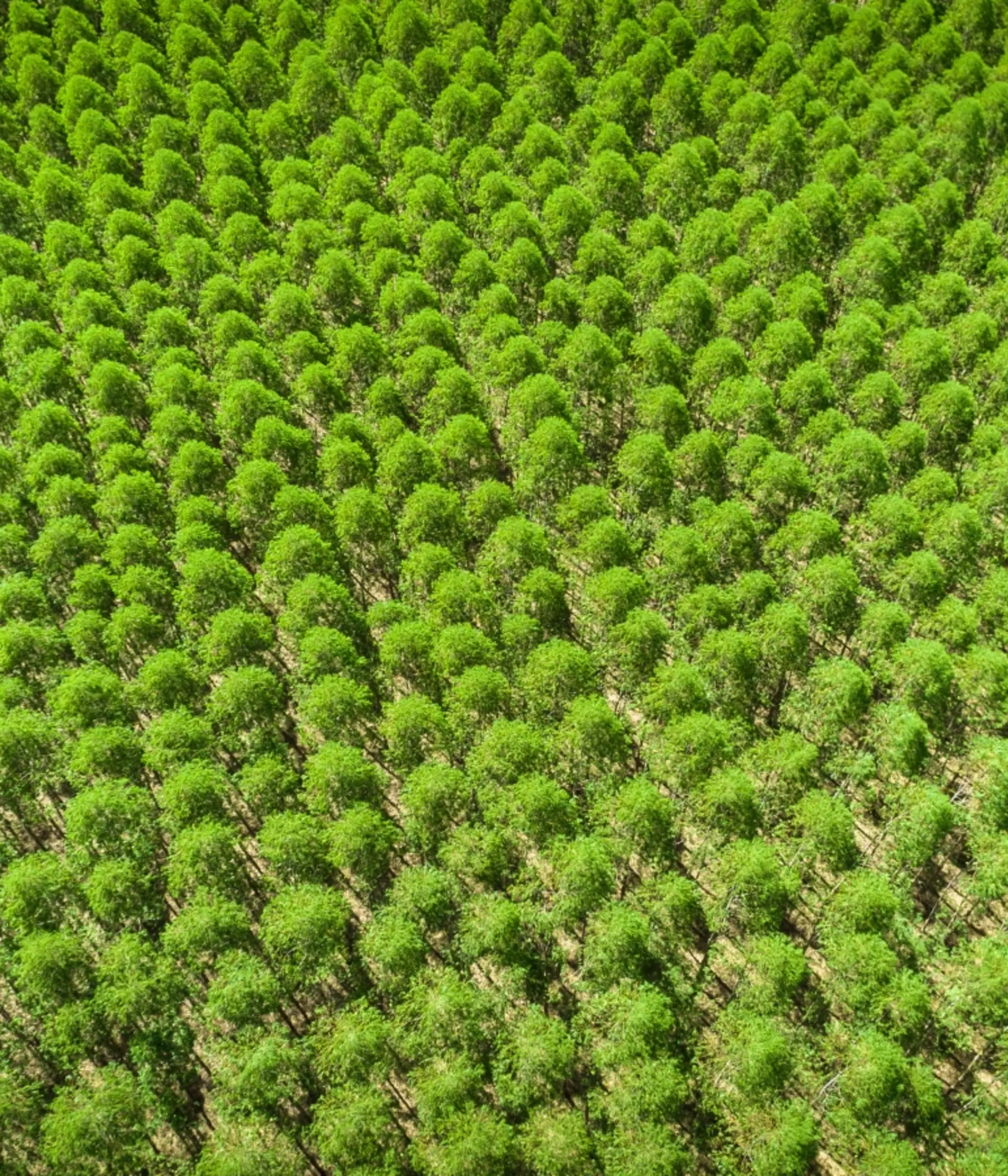
Sam Ross
Sustainable Business Project Analyst
The Complex World of Tropical Wood: From Humid Forests to Global Markets
In the hot and humid rainforests of Southern Cameroon large stands of Sapele (Entandrophragma cylindricum) tower above the forest floor. Prized for their deep reddish-brown colour and high density, these trees are commonly harvested as an alternative to Mahogany.
From the forest, felled logs are transported to sawmills for primary processing and sent onwards. A significant proportion will make their way to the Cameroonian port of Douala, destined to be exported around the world, processed further, and ultimately transformed into an array of products, including furniture, flooring, and even musical instruments.
Variations of this journey are replicated throughout the tropics, as a diverse mix of commercially harvested tree species are sourced from natural forests and plantations and directed towards a vast range of end-products that quietly underpin much of our daily life.
Tropical forest supply chains are complex and multifaceted; they involve many stakeholders across several geographies and industries, operating within a web of domestic and international regulations. As I’ll discuss over the rest of this blog, public reporting of company information, or rather the absence of it, only adds to this complexity.
Assessing Tropical Timber & Pulp Companies
Since 2017, ZSL has been conducting annual assessments of the tropical forestry companies that produce, process, and trade in this complex world, through its SPOTT initiative.
This free online tool tracks the public disclosures of environmental, social, and governance (ESG) information by some of the world’s most influential soft-commodity companies across the timber & pulp, palm oil, and natural rubber sectors. Over the past two years, I have worked on conducting SPOTT assessments of the tropical forestry sector.
Growing up near the tropical rainforests of Western Java, I have always been fascinated with the sheer diversity of life held within these ecosystems. It has only been more recently, through my university studies and now through working on SPOTT, that I have considered these havens of biodiversity as places of business and industry.
One of the most interesting and challenging aspects of my work has been the opportunity to engage directly with the timber and pulp companies operating in these biodiverse ecoystems. These discussions have been incredibly useful in understanding the scale of influence tropical forestry companies have on the landscapes they operate in and source from.
The Scale of Tropical Forestry Operations
Together, the 100 companies we assess on SPOTT control at least 53 million ha of tropical forests, across 19 different countries. This area alone roughly represents the size of France and does not include the many more millions of hectares of forests owned by the suppliers of these companies.
Given their significant presence and influence on these landscapes, ensuring timber and pulp companies act transparently and sustainably is ultimately critical to preserving the biodiversity of tropical forests and their capacity to provide natural resources, livelihoods, and other ecosystem services at both a local and global scale.

Eight Years of SPOTT Timber and Pulp Assessments: Progress and Setbacks
This year marks eight years of SPOTT assessments on the tropical forestry sector. Since the first assessment in 2017, the average transparency score has decreased from 37.1% to 24.1% in 2024.
This decline can partly be explained by an increase in the number of indicators used and companies assessed from 2019 onwards (see graph). However, even in the last five years the score has only risen slightly – during a period that has seen strengthening legislation and a landmark policy shift for forests at COP26, with the global pledge to end deforestation by 2030.
Despite this regulatory pressure and increased ‘forest focus’, our data shows the overwhelming story for tropical forestry companies has been one of inertia. With only slight progress across all 10 of our ESG indicator categories, these marginal gains are simply out of pace with the level of urgency required to meet global targets.
The SPOTT framework scores companies on 182 indicators, but for the purpose of this blog I’ll focus on the lack of progress across the key areas of deforestation and community rights, as well as the wider issue of opaque supply chains.

Tropical Deforestation: A Critical Challenge
In 2022, global deforestation covered 6.6 million ha, with 96% of this occurring in tropical regions. The production of agricultural commodities, including timber and pulp, is a major driver of this loss. Comprehensive disclosures on how tropical forestry companies manage deforestation risk across their supply chains is therefore vital.
As a minimum, forestry companies should have an unambiguous and clearly defined commitment to zero deforestation that applies to both their own operations and their suppliers’. Beyond this, companies should also report on the actions they are taking to implement this commitment: What measures are used to monitor deforestation? How often does monitoring take place and at what scale?
Yet, our research shows that while just over half of companies (52.7%) commit to zero deforestation, just 18.7% clearly define this commitment, and even fewer (14.3%) disclose the monitoring tools they are using to implement it. These indicators offer a useful reflection of a concerning trend we see across our data – whilst many companies make ESG commitments, very few publish evidence of their implementation.

Peopled Landscapes: The Social Challenges in Tropical Forestry
The social element, or ‘S’, in ESG can sometimes be neglected, so it is important to reiterate that the tropical forests SPOTT companies operate in are peopled landscapes. It is not uncommon for forestry concessions to border and even overlap with the lands of Indigenous Peoples’ (IPs) and local communities’ (LCs), many of whom depend on these forests for their most basic needs. The actions forestry companies take can have significant impacts on the rights and livelihoods of these groups.
SPOTT’s media monitor, which tracks negative reports about assessed timber & pulp companies, finds that issues around community, land, and labour rights represent the most reported category, receiving even greater coverage than deforestation. Tropical forestry companies have been accused of a range of violations, including destroying community land, illegally encroaching on Indigenous territories, and failing to provide free, prior, and informed consent (FPIC) before company operations.
Our assessment data reflects these reports and shows tropical forestry companies must do a lot more to demonstrate they are paying due consideration to the potential human impacts of their operations.
| Indicator | Number of Companies | |
| Own Operations | Supplier Operations | |
| Commitment to respect Indigenous and local communities' rights | 46 companies / 95 (48.4%) | 8 companies / 93 (8.6%) |
| Commitment to respect legal and customary land tenure rights | 20 companies / 95 (21.1%) | 9 companies / 93 (9.7%) |
| Commitment to obtain free, prior and informed consent (FPIC) prior to all new developments | 28 companies / 95 (29.5%) | 13 companies / 93 (14.0%) |
Opaque Supply Chains
Many of the issues around unsustainable practices in the tropical forestry sector are compounded by the absence of clear reporting on company supply chains.
Only 17/80 (21.3%) tropical forestry companies assessed on SPOTT disclosed the countries they are sourcing from - the most basic level of supplier reporting. Most strikingly however, just 1/88 (1.1%) companies published geo-referenced maps of all the forests they source from, and only 1/84 (1.2%) companies disclosed the names and locations of all their supplying mills.
This issue is pervasive across the tropical forestry sector and has negative impacts both within and beyond timber and pulp supply chains. The void of information can make it incredibly difficult for downstream buyers to monitor activities and identify risks in their supply chain and increases the risk of companies sourcing from bad actors without being held accountable.
Transparency: A Joint Effort
Public disclosures can play a key role in monitoring company progress, ensuring accountability, and ultimately strengthening sustainability across the sector. However, after eight years of assessments, it is evident that transparency is unlikely to come from the tropical forestry companies alone.
Our own experience shows that engagement is key - this year, companies that engaged with SPOTT increased their draft assessment score by an average of 4pp. The challenge lies in encouraging more companies to take this step.
Achieving this change will require a joint effort - involving a crucial role for the private sector companies that hold the greatest influence. For example, downstream buyers of timber and pulp can help drive transparency by incorporating public disclosure requirements into their sustainable sourcing policies. Similarly, investors can make financing conditional on tropical forestry companies meeting and reporting on key sustainability targets.
As we continue to track the public disclosures of timber and pulp companies, we urgently call on buyers and investors to exert this influence and push for a more sustainable and transparent tropical forestry sector.
If you’re a soft commodity company, investor, or buyer seeking to enhance ESG performance and responsible sourcing, connect with us for tailored guidance, training and solutions.
